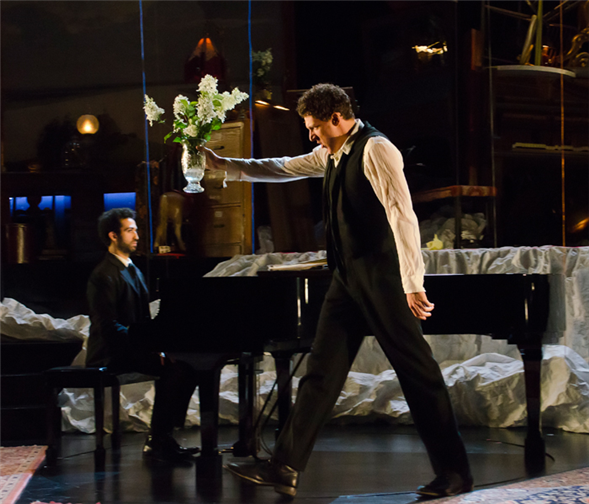Practical concerns inspire deep meaning in Dave Malloy's new musical
---
Never underestimate the power of practical limitations. In the theatre, at least, they often lead to a show's most innovative elements. Just look at what happened with Preludes, the new musical written and composed by Dave Malloy that's currently making its world premiere in Lincoln Center Theater's LCT3 program.
It's easy to imagine a $10 million version of this ambitious, probing show, which charts the artistic rise and fall (and rise) of Sergei Rachmaninoff, the 19th-century Russian composer. Because it grapples with the fundamental nature of creativity as much as the biography of a single artist, the piece demands more than a realistic set or straightforward costumes. Malloy has placed the entire production inside Rachmaninoff's mind, which means the character's memories, fears, and passions can take physical form. Dreamlike, the story bounces around in time, lets songs evolve into grand operatic performances, and even features a mountain that rises on stage from somewhere deep in the composer's subconscious.
All of this is accomplished with a six-person cast and the limited budget of an off-Off Broadway run. But that's not to say Preludes feels chintzy. Instead, the company turns its restrictions to its creative advantage, finding imaginative ways to realize the script's requirements. (Without giving too much away, it's fair to say that set designer Mimi Lien makes fabric, ropes, and pulleys seem quite mountainous indeed.)
Malloy himself used a similar mindfulness when he developed the show with director Rachel Chavkin, and it often led him to a deeper understanding of what he wanted to accomplish.
For instance, as he tries to cope with the critical failure of his first symphony or rediscover the inspiration that made him a teenage phenomenon, Rachmaninoff has several encounters with real-life masters like Chekhov, Tolstoy, and Tachikovsky, and they all teach or rebuke him in a significant way. As it happens, all those characters – plus three others – are played by Chris Sarandon.
"Some of that's just the practicality of not having an enormous cast where people are just in one scene," says Malloy. "But there is something in having Chris embody this Master character who's trying to help Rach gain some kind of enlightenment and some kind of perspective on his situation."
To that end, the final scene delivers a serious payoff that revolves around Sarandon playing all those "wise men."
Notice, too, that Malloy refers to "Rach," which is the version of Rachmaninoff played by Gabriel Ebert. This is the character who does most of the talking and the acting, yet the same time, there's another Rachmaninoff, played by Or Matias, who mostly plays the piano.
The initial decision to split the character was, again, based in a mundane concern. "I myself have played some of Rachmaninoff's music, and it's incredibly difficult," Malloy says. "You really need a virtuoso pianist to play it. But I knew the acting arc of the show would be enormous, too, and that I also needed a virtuoso actor. And rather than spending my entire life waiting for that to be in one person, I thought about splitting it up."
Now he finds a satisfying resonance in the divided role. As he explains, "Once we decided Rach had to be played by two people, we thought, 'Well, what better way to dramatize this internal struggle that he's having than turning it into an external struggle – turning it into him fighting with himself?'"
Asked what the two halves of the composer specifically mean to him, Malloy says, "At times, Or is the muse that Rachmaninoff is struggling to be in conversation with and for whatever reason is just not showing up. I also feel like the piano player represents the part of Rachmaninoff's mind that is able to turn off and exist purely in music and spirit without overthinking things, whereas Gabe is playing the super 'mind' part of Rachmaninoff."
He continues, "That's become one of my favorite elements of the show – the weird dichotomy between those two and what exactly the two halves represent. Because I think it changes over the course of the show."
---
Mark Blankenship is the editor of TDF stages
Photos by Kyle Froman. Top photo: Or Matias (seated) and Gabriel Ebert as the two halves of Rachmaninoff
